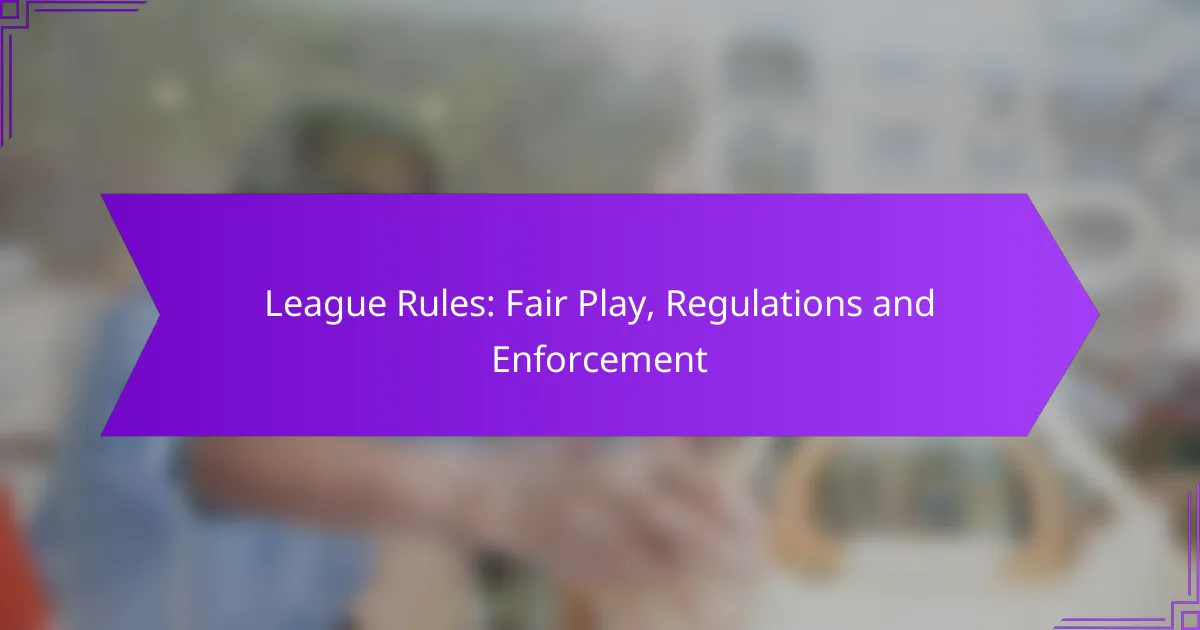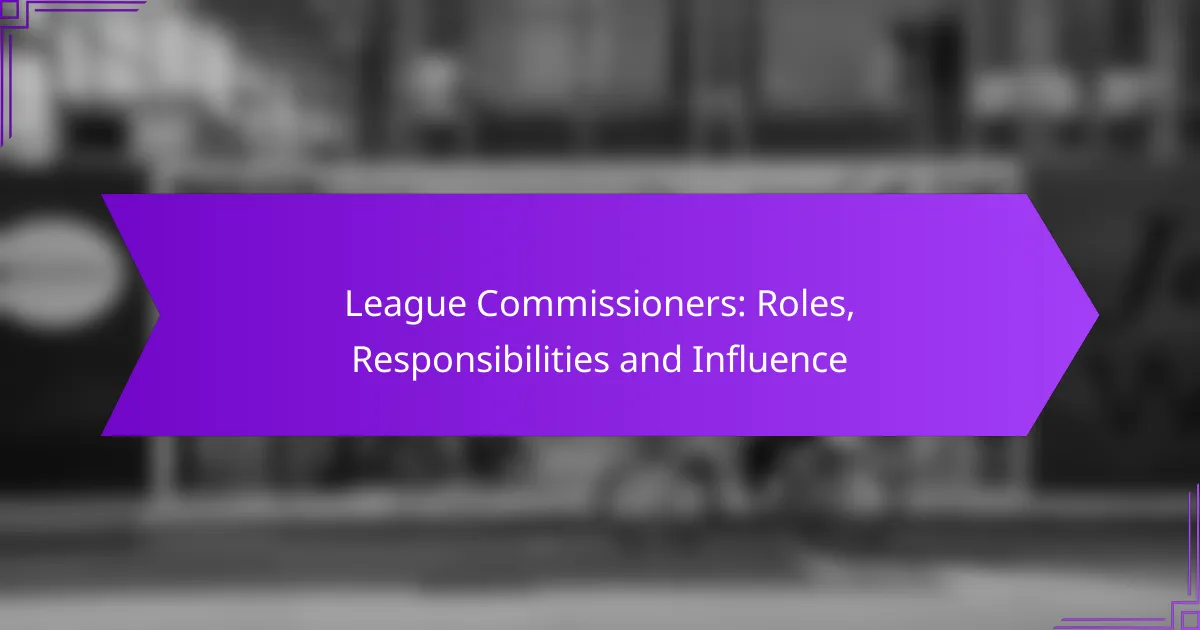League rules play a crucial role in maintaining fair play, integrity, and safety among participants in sports. By establishing a code of conduct and enforcing regulations through referees and disciplinary committees, leagues ensure that competitions are conducted fairly. Violations of these rules can result in penalties such as fines and suspensions, reinforcing the importance of sportsmanship and adherence to established standards.

What are the key fair play regulations in sports leagues?
Key fair play regulations in sports leagues focus on promoting integrity, respect, and safety among players and officials. These rules are designed to ensure that competitions are conducted fairly and that all participants adhere to a code of conduct that fosters sportsmanship.
FIFA Fair Play Code
The FIFA Fair Play Code emphasizes respect for opponents, officials, and the game itself. It encourages players to demonstrate sportsmanship by playing within the rules and accepting decisions made by referees without dissent.
Key principles include avoiding violent conduct, showing respect towards teammates and opponents, and promoting a positive atmosphere in matches. Violations can lead to sanctions ranging from fines to suspensions, depending on the severity of the infraction.
NBA Code of Conduct
The NBA Code of Conduct outlines expected behaviors for players, coaches, and team personnel. It stresses the importance of professionalism, both on and off the court, and mandates adherence to league rules and regulations.
Violations, such as unsportsmanlike conduct or substance abuse, can result in fines, suspensions, or even expulsion from the league. The NBA also emphasizes the importance of community engagement and expects players to act as role models.
NHL Player Safety Rules
The NHL Player Safety Rules are designed to protect players from dangerous plays and injuries. These regulations include strict penalties for hits to the head, fighting, and other forms of reckless behavior.
Players found in violation of these rules may face fines or suspensions, which can vary based on the nature of the offense. The NHL also utilizes video reviews to ensure fair enforcement of these safety standards.
MLB Anti-Doping Policy
The MLB Anti-Doping Policy aims to maintain a level playing field by prohibiting the use of performance-enhancing drugs. Players are subject to regular testing, and violations can lead to significant penalties, including suspensions and fines.
The policy outlines specific substances that are banned and provides guidelines for the testing process. Players are encouraged to familiarize themselves with these regulations to avoid unintentional violations.
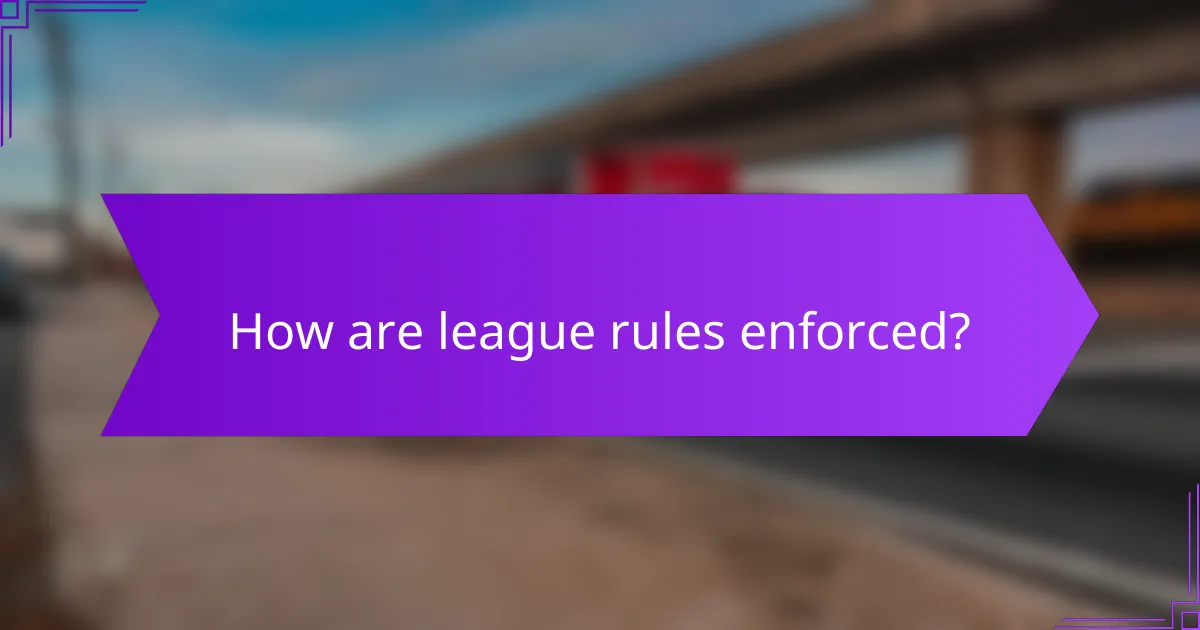
How are league rules enforced?
League rules are enforced through a combination of referee oversight, disciplinary committees, and a structured player appeals process. These mechanisms ensure that all participants adhere to the established regulations, promoting fair play and integrity within the league.
Referee and official oversight
Referees and officials play a crucial role in enforcing league rules during games. They are responsible for monitoring player conduct, making real-time decisions on rule violations, and issuing penalties as necessary. Their authority is vital for maintaining the flow of the game and ensuring compliance with the rules.
Officials often undergo training to interpret the rules consistently and fairly. They may utilize technology, such as video review systems, to assist in making accurate decisions, particularly in high-stakes situations where the outcome of the game is on the line.
Disciplinary committees
Disciplinary committees are tasked with reviewing incidents that occur during games, particularly those that involve serious violations of league rules. These committees evaluate evidence, including referee reports and video footage, to determine appropriate sanctions against players or teams.
Sanctions can range from fines to suspensions, depending on the severity of the infraction. Committees typically follow established guidelines to ensure that penalties are consistent and fair, helping to deter future violations and uphold the league’s standards.
Player appeals process
The player appeals process allows individuals to contest decisions made by referees or disciplinary committees. Players can submit an appeal within a specified timeframe, usually accompanied by supporting evidence or arguments for reconsideration.
Appeals are reviewed by a separate panel, which assesses the validity of the original decision. This process ensures that players have a fair opportunity to challenge rulings, fostering a sense of justice within the league. However, players should be aware that the appeals process can be time-consuming and may not always result in a favorable outcome.
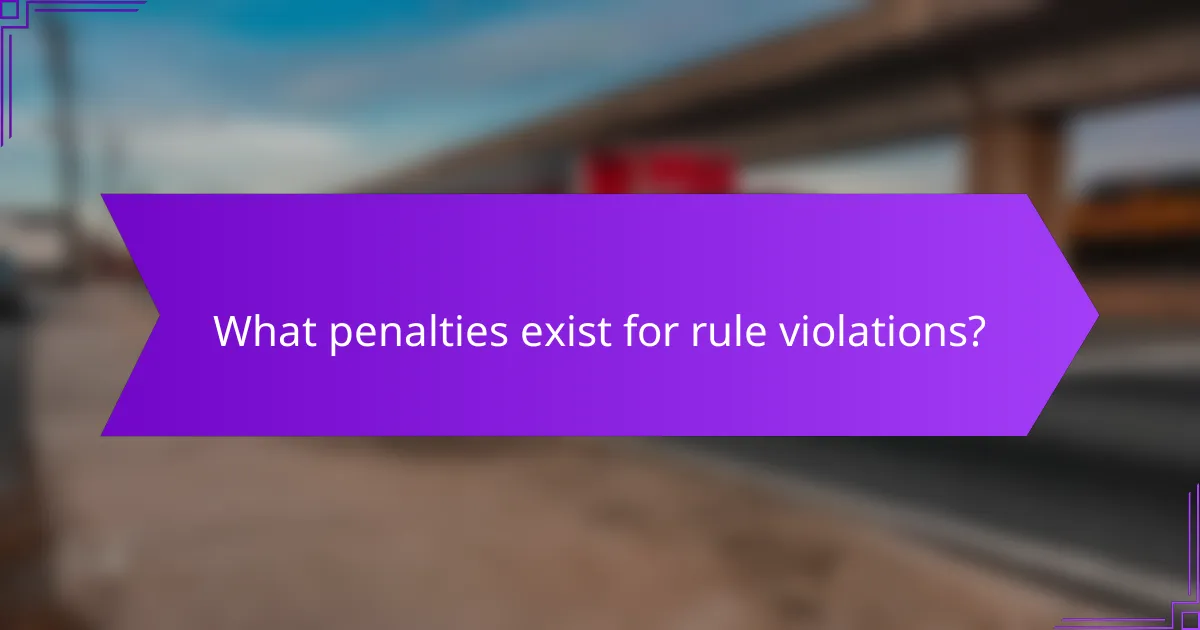
What penalties exist for rule violations?
Penalties for rule violations in leagues typically include fines, suspensions, game forfeitures, and player bans. These measures are designed to maintain fair play and uphold the integrity of the sport.
Fines and suspensions
Fines are monetary penalties imposed on teams or individuals for breaching league rules. The amount can vary widely, often ranging from a few hundred to several thousand dollars, depending on the severity of the violation.
Suspensions involve temporarily barring a player or staff member from participating in games or league activities. The duration of suspensions can range from a single game to multiple seasons, based on the nature of the infraction.
Game forfeitures
Game forfeitures occur when a team is deemed to have violated rules to the extent that they lose the match, regardless of the actual game outcome. This can happen due to issues like fielding ineligible players or failing to meet league requirements.
Forfeited games typically result in the opposing team being awarded a win, which can significantly impact standings and playoff eligibility. Teams should ensure compliance with all regulations to avoid this penalty.
Player bans
Player bans are severe penalties that prohibit an individual from participating in league activities for a defined period or indefinitely. Bans are usually reserved for serious offenses, such as doping violations or violent conduct.
The length of a ban can vary, with some lasting for a few games while others may extend for years. Players facing potential bans should seek to understand the league’s rules and the consequences of their actions to avoid such outcomes.
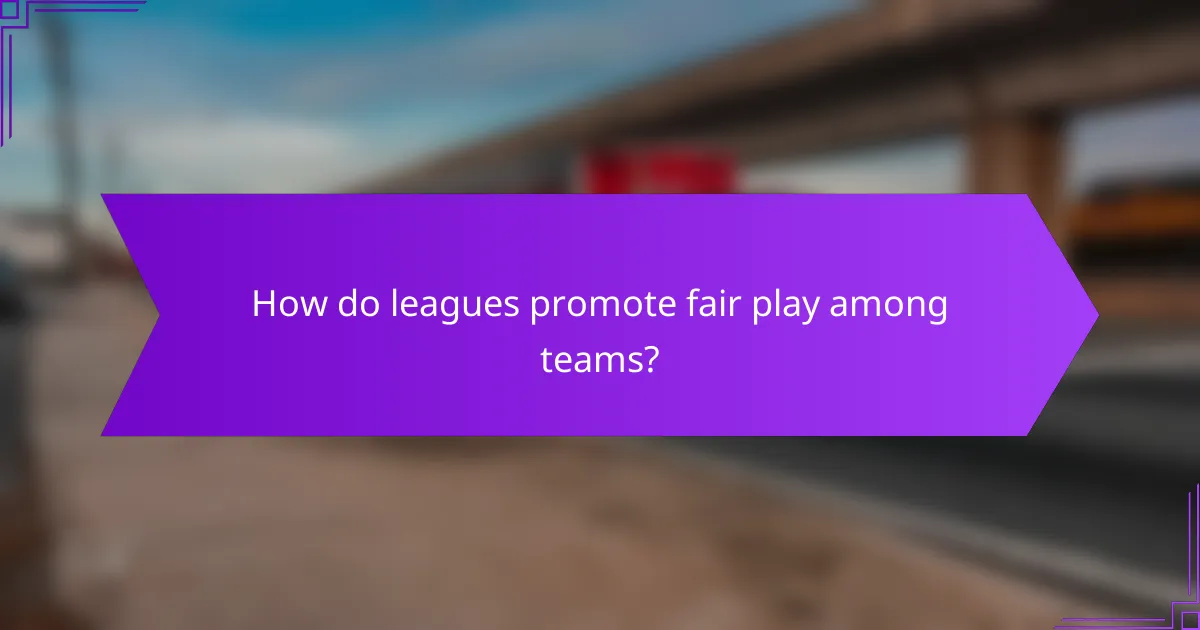
How do leagues promote fair play among teams?
Leagues promote fair play among teams through structured initiatives aimed at fostering sportsmanship, respect, and integrity. These efforts include educational programs, community outreach initiatives, and partnerships with organizations dedicated to ethical conduct in sports.
Educational programs
Educational programs are essential for instilling the values of fair play in athletes and coaches. Leagues often conduct workshops and seminars that cover the rules of the game, the importance of respect for opponents, and the consequences of unsportsmanlike behavior. These programs may also include online courses that teams can access at their convenience.
For example, leagues might implement mandatory training sessions at the beginning of each season, ensuring that all participants understand the expectations for fair play. This proactive approach helps create a culture of respect and accountability within teams.
Community outreach initiatives
Community outreach initiatives play a crucial role in promoting fair play beyond the field. Leagues often engage with local schools and youth organizations to teach the principles of sportsmanship and teamwork. These initiatives can include hosting events, such as sports clinics or friendly matches, where the focus is on enjoyment and learning rather than competition.
By involving the community, leagues can cultivate a supportive environment that reinforces positive behaviors. For instance, leagues might partner with schools to create programs that reward students for demonstrating good sportsmanship in both sports and academics.
Partnerships with organizations
Leagues often form partnerships with organizations that specialize in promoting ethical conduct in sports. These collaborations can enhance the effectiveness of fair play initiatives by providing resources, expertise, and broader outreach. For example, leagues might work with national sports associations or non-profits focused on youth development.
Such partnerships can lead to the development of comprehensive guidelines and resources that teams can use to foster a culture of fair play. Additionally, these organizations may offer support in monitoring compliance and addressing violations, ensuring that the principles of fair play are upheld consistently across all levels of competition.
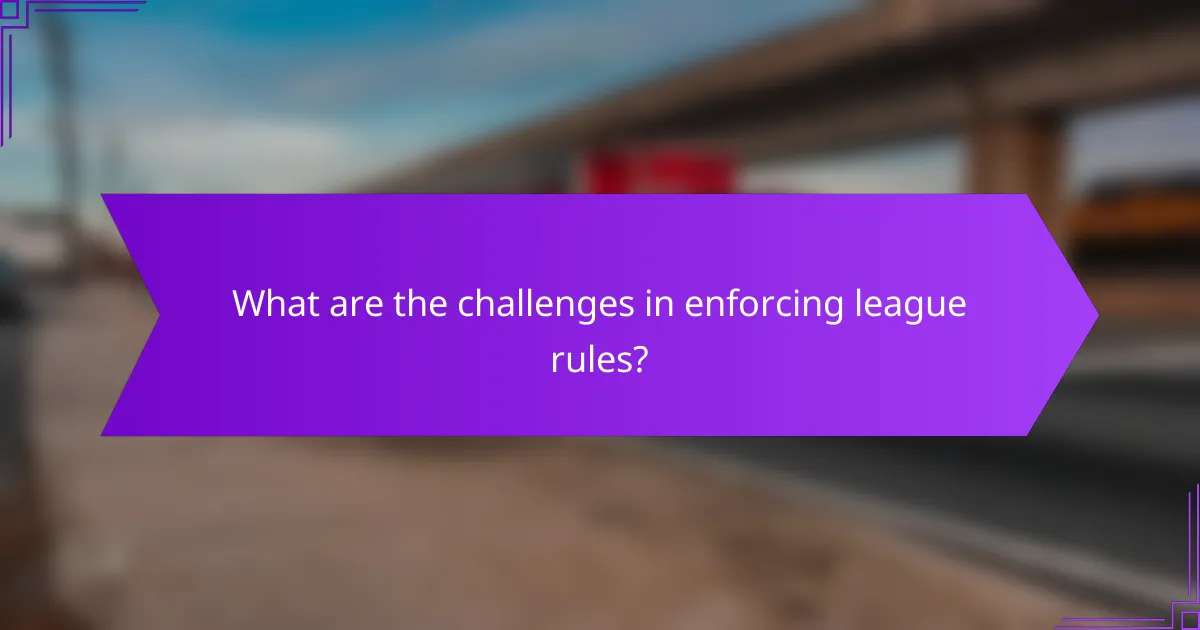
What are the challenges in enforcing league rules?
Enforcing league rules presents several challenges, including subjective interpretations by officials, inconsistent application across different games, and limitations in technology. These factors can lead to disputes and undermine the integrity of the competition.
Subjectivity in officiating
Subjectivity in officiating arises when referees or umpires interpret rules based on personal judgment. This can result in varying calls for similar incidents, leading to frustration among players and teams. For example, what one official sees as a foul, another may view as a fair play, creating inconsistencies in how the game is officiated.
To mitigate this, leagues can provide comprehensive training for officials, emphasizing standardized interpretations of rules. Regular reviews and feedback sessions can also help ensure that officials are aligned in their decision-making processes.
Inconsistent application of rules
Inconsistent application of rules can occur when different officials enforce the same rule differently in various matches. This inconsistency can affect the outcome of games and lead to perceptions of unfairness. For instance, a player may receive a penalty in one match for a specific action, while the same action goes unpunished in another game.
Leagues can address this issue by implementing clear guidelines and protocols for rule enforcement. Establishing a centralized review system to assess officiating decisions can help maintain uniformity across all games.
Technological limitations
Technological limitations refer to the challenges posed by the tools available for monitoring and enforcing rules. While technology such as video review systems can aid in decision-making, they are not infallible and can only address certain types of infractions. For example, technology may struggle with subjective calls that require human judgment.
To enhance enforcement, leagues should invest in advanced technologies and ensure that officials are trained to use these tools effectively. Regular updates and maintenance of technology can also improve its reliability during critical moments in games.
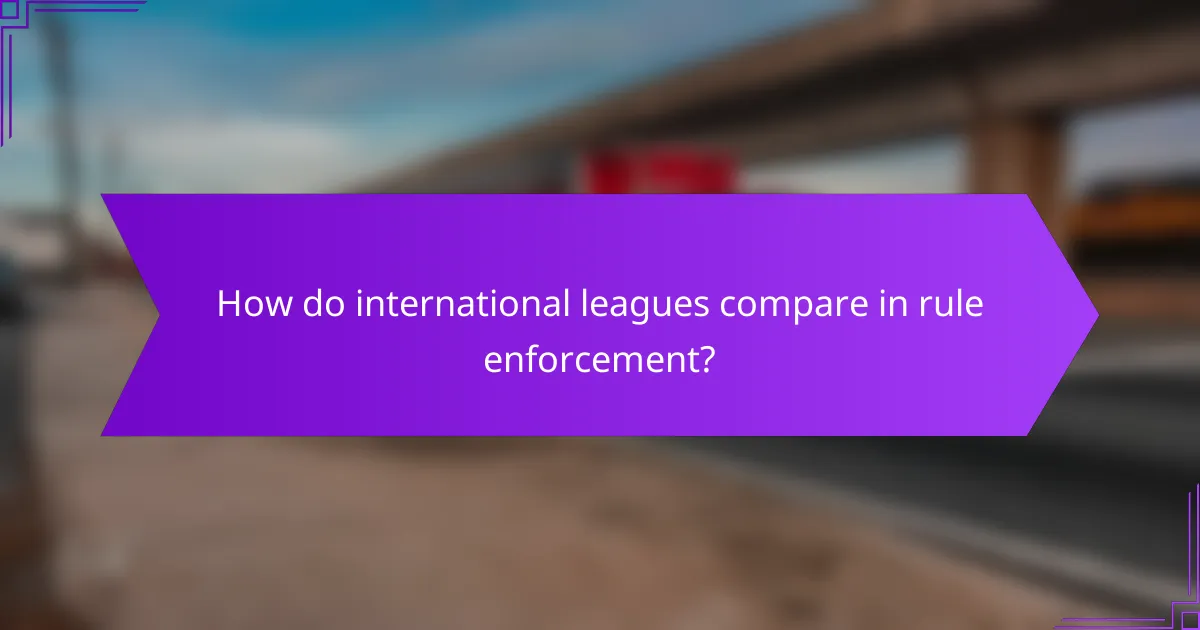
How do international leagues compare in rule enforcement?
International leagues vary significantly in how they enforce rules, with some leagues taking a more stringent approach than others. Factors such as cultural attitudes towards sportsmanship, regulatory bodies, and the specific rules in place contribute to these differences.
Differences in enforcement practices
Enforcement practices can differ widely between leagues, affecting everything from player conduct to game regulations. For instance, leagues like the English Premier League may impose stricter penalties for misconduct compared to others, emphasizing fair play and sportsmanship. In contrast, some leagues might prioritize entertainment, leading to more lenient enforcement of certain rules.
Additionally, the presence of technology, such as VAR (Video Assistant Referee), can influence enforcement. Leagues that utilize advanced technology often have clearer guidelines for officiating, which can lead to more consistent rule application.
Impact of cultural factors
Cultural attitudes towards sports can significantly shape how rules are enforced in different leagues. In countries where sportsmanship is highly valued, leagues may adopt stricter enforcement to uphold these ideals. For example, leagues in Scandinavia often emphasize fair play, leading to a lower tolerance for aggressive behavior.
Conversely, in regions where competitive spirit is more pronounced, such as in some South American leagues, enforcement may be more relaxed, allowing for a more aggressive style of play. This can create a stark contrast in how players and officials interact during games.
Examples of enforcement outcomes
Real-world examples illustrate the impact of enforcement differences. In the UEFA Champions League, strict adherence to regulations often results in significant penalties for teams that violate rules, such as financial fair play. This strict enforcement can deter teams from engaging in unethical practices.
On the other hand, leagues with less stringent enforcement may see repeated infractions without serious consequences, which can undermine the integrity of the competition. For instance, a league that overlooks minor infractions may inadvertently encourage a culture of rule-breaking among players.
